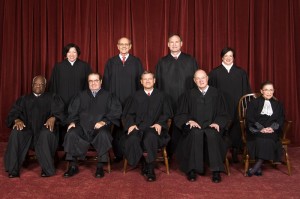The U.S. Supreme Court is set to begin hearing oral arguments this week in one of the most important church-state cases in decades.
In Hosanna-Tabor Church v. Equal Employment Opportunity Commission, the court will consider whether a Lutheran school in Michigan is subject to a federal law banning discrimination based on a disability. In 2005, the church school fired a teacher diagnosed with narcolepsy who was a "commissioned minister" who taught mostly secular subjects -- about 45 minutes of her seven-hour work day were spent teaching religious subject matter, according to legal briefs.
An editorial today (Oct. 4) in the New York Times said in part:
Under the First Amendment, the government cannot interfere in a church's management of "ministerial employees" when they perform religious functions. But is a teacher at a religious school that kind of employee?
A case on Wednesday is a dispute between Hosanna-Tabor Evangelical Lutheran Church and Cheryl Perich, a former teacher at the church's school in Redford, Mich. When she became sick and turned down the offer of a modest payment to leave, the school fired her and she filed a grievance with the Equal Employment Opportunity Commission. The Court of Appeals for the Sixth Circuit said she could sue the church for illegal retaliation under the Americans With Disabilities Act.
The issue is whether enforcement of that law violates the church's right to free exercise of religion. Ministers and other religious workers are barred from suing their church employers. Lower courts have said teachers are also barred from suing when they teach religious subjects or have a central role in the mission of the church. ... Congress intended the rule against retaliation to apply to churches as it does to secular groups. Ms. Perich's suit does not interfere with religious freedom. It will give her a basic protection of the disabilities law - the chance to have her day in court.
Perich was fired for insubordination and disruptive conduct in 2005. The church congregation that same year approved her termination.
"Called teachers, like Perich, normally receive tenure and may be dismissed only for cause," according to court records.
Forcing the church to retain Perich after she was fired would be an unconstitutional restriction on its right to choose its religious leaders, church leaders said in a statement.
University of Notre Dame Law Professor Rick Garnett, a frequent commentator on the Supreme Court, explains:
"The case ... involves the judge-made 'ministerial exception' to employment-discrimination laws," Garnett said. "This exception prevents courts from second-guessing employment decisions made by religious employers regarding 'ministerial' employees. Although the Supreme Court has never squarely addressed this exception, it is a crucial doctrine for protecting religious freedom and the separation of church and state. Church-state separation is often misunderstood and misapplied. Some see it as a rule that banishes religious expression and belief to the strictly private sector. In fact, church-state separation is not about confining or combating religion, but is instead about limiting the reach of government and protecting the right of religious communities to make their own decisions about religious matters. A community that respects the distinction between political and religious authority, and that recognizes the limits of the state's power over religious matters, is one in which the rights of all
Got something to say about what you're reading? We value your feedback!
